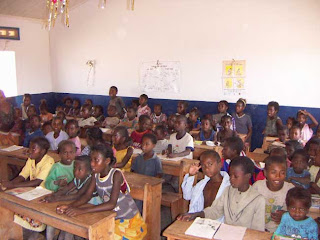Week one of Blue Ventures Expedition no. 36 was exciting – filled with activities and experiences.
After three days on the road through the wonderfully diverse landscape of Madagascar we arrive in Tulear. Another gruelling 12 hours by an ancient truck on a pair of tracks brings us to our destination, Coco Beach and the Blue Ventures Camp. The journey brings home how remote Andavadoaka is and how privileged we are to be here.
Cyclone Ivan has lashed the coast for the past 3 days. Activities are scheduled around the weather so instead of diving, we’ve been receiving science training, teaching English in the village, manufactured stencils for painting the new Blue Ventures Boat and partied in the village.
I have had three dives – on the first one I managed to spot some of the fish species I had learned: angels, surgeons and clown fish. I realize how studying the species is already enhancing my diving experience. Unfortunately, the diving since then has been getting worse as the storm has churned up the water badly.
This is a great opportunity, however, to get involved in one of the many other projects BV is doing here. On Tuesday, 4 of us are leaving with Lalao and Hanta to complete a survey of the mangroves south of Tulear.
The second blog comes from volunteers, Yin Chang and Tom Heimhuber:
English Teaching in Andava
Each Saturday at 3:00 pm we take the walk through the village to meet our class from the Catholic school. All the while we wonder if our preparation and lesson plan will be met with success or dismal failure and an eventual dispersal of our students.
This past week we planned to play supermarket, bringing candles, soap and empty boxes of items such as cookies and mosquito coils to “sell”. We were happy to meet our 6 students (an unusually small class) and anticipated a more controlled and attentive class compared to our class of stragglers last week who did not belong to the school.
We made introductions and settled down onto a shady area of the school yard. We reviewed numbers for money, a skill that required these 9-12 year olds to leap through 1-10 and into the thousands due to the size of Malagasy money and the price of items here. We read our labels for our items and informed them of their prices before giving them paper money to purchase our market items.
 Meanwhile we slowly started to gain the interest of nearby groups who began to wander over to see what activities we were doing. Soon there was a frenzy to play at the market and we had to continuously ask the students to stand back.
Meanwhile we slowly started to gain the interest of nearby groups who began to wander over to see what activities we were doing. Soon there was a frenzy to play at the market and we had to continuously ask the students to stand back.
Our class tripled, maybe quadrupled in size; however, we were impressed that the students were able to quickly give and request correct amounts for their items. It was a satisfying experience since we achieved our goals for the lesson and also managed to appropriate other students, surely a sign of an interesting class.
Then there was war! Impressed by the surprisingly good performance of most of our students we thought it would be a good idea to leave a pack of biscuits for them (they are called biscuits here; in our please-let-there-be-taste world a shop owner would not sell a single pack of them).
We thought that it would also be a good idea to hand out the single bits to one student after another and thus control the whole procedure. And we thought that maintaining a security distance of approx 3 meters to the rest of the students was a good idea. We were wrong. And we realised that as soon as we gave the first biscuit to the first student.
Within seconds we saw more children per cubic meter than we did ever before. Children everywhere, stapled above each other, screaming and grasping after the biscuits that were somewhere underneath them – and there were still more children heading towards us in high speed; from everywhere.
The only thing we could do was to save ourselves by rushing away and looking at the spectacle from a safe distance in shock and disbelief at the dust storm that became the students. It was crazy; we never saw anything similar before.
So we learned our lesson this afternoon, too; we will definitely think twice before believing that acts of generosity in our minds translate the same way in Madagascar where even paper candies are wanted with such ferocity.

